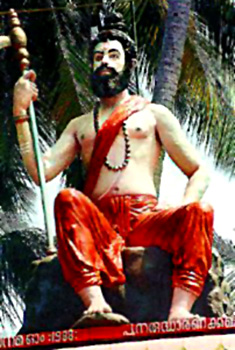 Parasurama was the incarnation of Lord Vishnu and in Kerala the legend attached to him is that the state was created by him. Parasurama is believed to be the sixth of the ten incarnations or avatars of Lord Vishnu. The very meaning of the word `Parasu` is `axe` in Sanskrit language and thus the meaning of the word Parasurama is `Ram with Axe`. The chief purpose of the birth of this great man was to save the whole world from the oppressive Kshatriyas, the ruling caste. The good king Mahabali, one of the legends of Kerala, lost his land to Lord Vishnu who gained it in the myth which explains the festival of Onam, but Vishnu in his turn was a loser of land in the creation myth of the Nambudiri Brahmins, traditionally the highest of all the many castes of Kerala. After playing his trick, as the dwarf Vamana, on the unfortunate Mahabali and winning his kingdom from him, Vishnu was incarnated, for the sixth time, as the son of the Brahmin sage Jamadagni and took the name of Parasurama.
Parasurama was the incarnation of Lord Vishnu and in Kerala the legend attached to him is that the state was created by him. Parasurama is believed to be the sixth of the ten incarnations or avatars of Lord Vishnu. The very meaning of the word `Parasu` is `axe` in Sanskrit language and thus the meaning of the word Parasurama is `Ram with Axe`. The chief purpose of the birth of this great man was to save the whole world from the oppressive Kshatriyas, the ruling caste. The good king Mahabali, one of the legends of Kerala, lost his land to Lord Vishnu who gained it in the myth which explains the festival of Onam, but Vishnu in his turn was a loser of land in the creation myth of the Nambudiri Brahmins, traditionally the highest of all the many castes of Kerala. After playing his trick, as the dwarf Vamana, on the unfortunate Mahabali and winning his kingdom from him, Vishnu was incarnated, for the sixth time, as the son of the Brahmin sage Jamadagni and took the name of Parasurama.
Parasurama was the renowned warrior-sage who was the son of Sage Jamadagni and his wife Renuka. There is a belief that the previously peaceful ashrama or cottage of the Sage Jamadagni was ransacked by King Kartavirya Arjuna with his Kshatriya army who desired to abduct the divine cow Surabhi by force. After getting a negative response from the sage the Kshatriya king destroyed his hermitage and killed the Sage Jamadagni. At that time Parasurama was away from the ashrama and he returned home to find his father dead and a crying mother. Deeply struck by the grief of losing her husband, Renuka Devi hit her chest twenty one times. Filled with the fire of revenge and his mother`s anguish, Parasurama promised to his self that he would take this revenge by abolishing the race of Kshatriyas from the world twenty one times. For this purpose, Parasurama went out to acquire knowledge of the divine arms and weapons by undertaking extreme penance to appease Lord Shiva.
Parasurama proceeded to slaughter all the males of the Kshatriya caste. He massacred these constantly resurrected enemies twenty one times, until he had wiped them from the earth. Doubtless this is a mythical explanation of the fact that the chiefly caste of the Aryan invaders appears to have been almost exterminated in the series of civil wars condensed into the story of the great slaughter at the battle of Kurukshetra in the Mahabharata ; later Kshatriyas, such as the Rajputs, seem to have been elevated from the ranks of invading warrior races like the Sakas and the Huns, who gradually lost their identity in Hindu society. But for Keralans the important part of the legend of Parasurama is a kind of pendant added later by the local Nambudiri Brahmins. According to the Keralamahatmyam, a Brahmin text which reached its final late as the eighteenth century, Parasurama underwent a great change for having destroyed the Kshatriyas, as part of which, on the advice of the sage Visvamitra, he gave all India to the Brahmins, who immediately and rather ungratefully expelled him. He retired to the summits of the Western Ghats, then the ultimate edge of the land, and called on his fellow gods for help.
Subramaniam, the peacock-riding son of Siva, who under the name of Murugan has always been a favourite deity in Kerala, interceded on the behalf of Parasurama with Lord Varuna, the God of the Sea who agreed to give the exiled hero all the land he could cover with a throw of his axe from the mountains where he stood. Parasurama made his cast, the axe landed near Cape Comorin, and the whole strip of land which is now Kerala rose at once from the sea. Presumably to show his total humility, Parasurama then settled on the new land some sixty four families or clans of Brahmins of the Nambudiri sub-caste, who had remained faithful to the pure teachings of the Rig Veda, and on his eventual departure, gave them sovereign rights. Like the modern Malayalis, the Brahmins found it impossible to agree, and their primeval republic declined into chaos. Parasurama, however, had been prudent enough to advise them, if they could not rule themselves, to invite kings from outside the country, and so began a line of monarchs called the Perumals. This very place is called as Parasurama`s land currently in the state of Kerala. This legendary tale of Parasurama is narrated to the children of Kerala, who are proud of the origin of their motherland. The Geologists also agree that the soil of Kerala has some evidence of being made from marine seismic activity.






